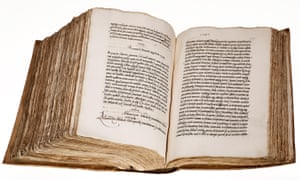It sounds like something from Carlos Ruiz Zafón’s The Shadow of the Wind and his The Cemetery of Forgotten Books: a huge volume containing thousands of summaries of books from 500 years ago, many of which no longer exist. But the real deal has been found in Copenhagen, where it has lain untouched for more than 350 years.
The Libro de los Epítomes manuscript, which is more than a foot thick, contains more than 2,000 pages and summaries from the library of Hernando Colón, the illegitimate son of Christopher Columbus who made it his life’s work to create the biggest library the world had ever known in the early part of the 16th century. Running to around 15,000 volumes, the library was put together during Colón’s extensive travels. Today, only around a quarter of the books in the collection survive and have been housed in Seville Cathedral since 1552.
The discovery in the Arnamagnæan Collection in Copenhagen is “extraordinary”, and a window into a “lost world of 16th-century books”, said Cambridge academic Dr Edward Wilson-Lee, author of the recent biography of Colón, The Catalogue of Shipwrecked Books.
“It’s a discovery of immense importance, not only because it contains so much information about how people read 500 years ago, but also, because it contains summaries of books that no longer exist, lost in every other form than these summaries,” said Wilson-Lee. “The idea that this object which was so central to this extraordinary early 16th-century project and which one always thought of with this great sense of loss, of what could have been if this had been preserved, for it then to just show up in Copenhagen perfectly preserved, at least 350 years after its last mention in Spain …”
The manuscript was found in the collection of Árni Magnússon, an Icelandic scholar born in 1663, who donated his books to the University of Copenhagen on his death in 1730. The majority of the some 3,000 items are in Icelandic or Scandinavian languages, with only around 20 Spanish manuscripts, which is probably why the Libro de los Epítomes went unnoticed for hundreds of years. It was Guy Lazure at the University of Windsor in Canada who first spotted the connection to Colón. The Arnamagnæan Institute then contacted Mark McDonald at the Metropolitan Museum of Art in New York, who passed it on to Wilson-Lee and his co-author José María Pérez Fernández, of the University of Granada, for verification.

A discovery of immense importance … The Libro de los Epítomes. Photograph: Suzanne Reitz/Arnamagnæan Institute, University of Copenhagen
“They sent me the photos. I was sitting on a beach at the time and I said ‘you’ve got to be flipping kidding me’. It’s the major missing piece from the library,” said Wilson-Lee. “It’s an amazing story. Instead of being a needle in a haystack, it was a needle in a bunch of other needles.”
After amassing his collection, Colón employed a team of writers to read every book in the library and distill each into a little summary in Libro de los Epítomes, ranging from a couple of lines long for very short texts to about 30 pages for the complete works of Plato, which Wilson-Lee dubbed the “miracle of compression”.
Because Colón collected everything he could lay his hands on, the catalogue is a real record of what people were reading 500 years ago, rather than just the classics. “The important part of Hernando’s library is it’s not just Plato and Cortez, he’s summarising everything from almanacs to news pamphlets. This is really giving us a window into the entirety of early print, much of which has gone missing, and how people read it – a world that is largely lost to us,” said Wilson-Lee.
Wilson-Lee and Pérez Fernández are currently working on a comprehensive account of the library, which will be published in 2020. They are also working to digitise the manuscript, in collaboration with the Arnamagnæan Institute.
“It’s always thrilling as a scholar and a biographer to realise there is still stuff out there,” said Wilson-Lee. “It’s a question of getting out there, [and] looking in unobvious places.”